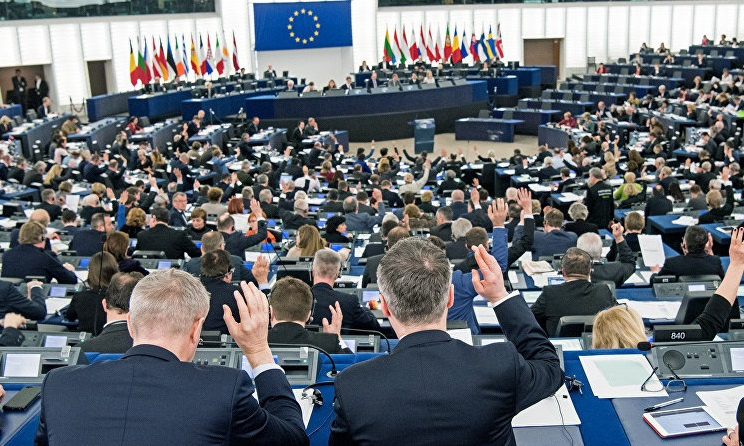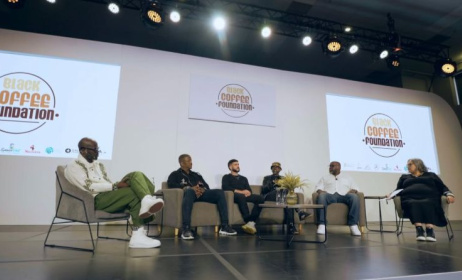Coalition for Effective Copyright in SA welcomes EU directive
The European Parliament this week voted in favour of the EU Copyright Directive, which contains the controversial Article 13. The development has been welcomed by the Coalition for Effective Copyright in South Africa, which contends that the EU directive makes provisions against the exploitation of content creators unlike South Africa's Copyright Amendment Bill.
 European Parliament members voting.
European Parliament members voting.
In a recent interview with Music In Africa, outgoing Southern African Music Rights Organisation (SAMRO) CEO Nothando Migogo agreed with the coalition's sentiments.
“The Copyright Amendment Bill is imminently about to be passed," she said. "I know that it obviously went through Parliament and then it was passed at the National Council of Provinces and I think we might hear it was signed into law any day from now. The whole problem with the copyright amendment bill is that we've been trying to articulate for some time that it doesn’t go far enough to protect composers and rights holders. Even though it gives composers a right of communication to the public, meaning 'no one can communicate my music publicly such as streaming without my permission', the bill doesn’t go far enough to say, 'When someone streams your work without your permission here is a clearly actionable punitive clause that you can invoke to protect that.'
Below is a statement released by the Coalition for Effective Copyright in South Africa after the passing of the EU directive and ahead of what is expected to be the inevitable signing into law of the Copyright Amendment Bill:
"The coalition welcomes the approval by the European Parliament of the Directive on Copyright in the Digital Single Market. Among other provisions, the European Copyright Directive – passed by 348 MEPs to 274 – requires websites that host copyright-protected content uploaded onto their website to take responsibility in relation to that content either to license and fairly reward rightsholders or to work with rightsholders to prevent pre-identified infringing content from appearing or re-appearing on their sites.
The directive goes a long way to stopping large tech platforms from monetising content created by musicians, filmmakers, artists, writers and academics, while ignoring copyright, or paying the creators of that content a pittance. The large tech companies are also prevented from shifting what is rightly their own responsibility onto their individual users.
The directive has a parallel in South Africa, where the Copyright Amendment Bill (CAB) is soon to be presented to the president for signature, having been passed by the National Assembly and expected to be imminently passed by the National Council of Provinces.
While the European Parliament has taken a well-considered brave step against the exploitation of content creators by global tech giants, South Africa’s Parliament has disappointingly not followed suit: whilst the EU has studied the problem over a three-year process and engaged in dialogue lasting another three years, South Africa has not even conducted an independent impact assessment and brushed to the side concerns and impact assessments offered by for instance the publishing industry.
Despite a national outcry by a broad cross-section of society, and numerous submissions by interested parties, Parliament has largely ignored dissenting voices and doggedly processed the Bill, without a socio-economic impact assessment being conducted to assess the impact of the Bill on South African people and the economy.
The process of drawing up the Bill and selling its provisions to society has seen the Department of Trade and Industry (DTI) one-sided working with tech multinationals such as Google, which owns YouTube. This has raised fears of the legislative process is unbalanced and became more and more captured by tech interests and casts an unacceptable shadow on the credibility and integrity of the legislative process.
The Bill was meant to ensure content creators, including writers, publishers and artists, are enabled to earn a living and their Intellectual property sufficiently protected. Sadly, in its current form, the Bill continues to cite these interests, but only to harm those it is meant to help.
The Bill contains broad exceptions for free reuse of content as long as it is for “educational” purposes. Now, 80% of publishing in South Africa is in fact educational, which in the Bill is in any case an undefined term. In the absence of a DTI commissioned study, an economic impact assessment study by PWC and the Publishers Association of South Africa found that the Bill would destroy a third of publishing jobs.
Musicians will see their rights (in respect of performances) recognised as both exclusive rights and rights to prohibit, and yet subject to significant exceptions and transfer obligations to, for instance, the SABC. In addition, the rights when used in individual contracts will be governed by mandatory contractual provisions yet to be drafted by ministerial regulation (yet made retrospective in effect). When used collectively, the Bill destabilises collective management organisations and threatens existing revenues.
The net effect of the above summarized rough shot over artists’ interest is that the artists will have to live with a law that is confusing, contradictory and incapable of application., The law will leave stranded artists of all prospect of earning a just reward and deprive them of existing secure revenue streams.
What government should have done is work closely with WIPO to develop a clean, clear and simple law in consistent with WIPO Treaties (WCT, WPPT and Beijing).
We request that president show the same courage shown by European legislators and stand up to the global tech giants and put South Africa first. Stepping back from an ill-considered Bill is the only good choice: help South Africa to reach greater heights; heights which are well in reach due to the vast talent and spirit of its people. Send back the Copyright Amendment Bill to the National Assembly for it to be redrafted so that it more adequately balances the rights of content creators and content users."




























Comments
Log in or register to post comments